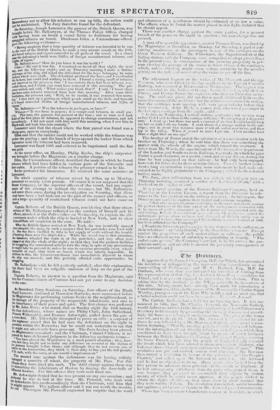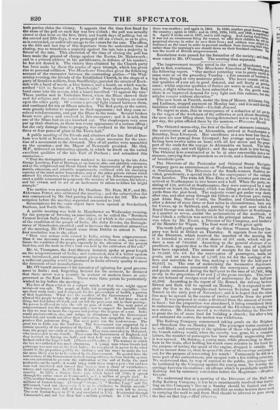7fIc Vrobillcrs.
It appears Bet :'. • .1 Cromptini, his intention en' S'eg the Iselin •.•"• reasscialding of : and \V. :Durham, who some ties 0 0. the representation of' Os it • anel is at •, -- taking time b:„ the
`.
• Thiesle, has announced .• .ontediatelv ori the .• I 0 I. M.P. for
re•tirinsss from eandidate for ..rs. This is .1:. in matters of 1.. tl.r iltrofhiving it this sort. Arr.1,:... r:t Constitutional es e. 1Vortley, youligeet s .1 a better selection ce• 0•'
'floe Carlisle Ile::: ...• h .. noulteed in bills. Ile,.
would deliver i. .1 I' HI:,
treaeliery to Ili. se ing-ls- the hons.• s
.was atoll le .00 dress, he wits I! lution deelarine, •• than the interrnielee considered to !lave. between the Britil. the breve l'rench the insult which 11 had es•er elme • hl
resolution -was 1.1
then moved a (1:arter," and eel: said h.. had no • first pereon to I
0 Ile had sule...,•• is.- ' was because means, of which I. obtain the right-, they were worth: ous applause;
lias 1. • •
%See- al e „ 'err. I fens s lea Oil.' Me,
Of' our fries ' I0•
el'
s
sink.
ent the part. . seemplish ti es approve. If is, they nitiod s;tow no. Tloo resolutitm was ;looks to Air. Attar. ere tlitirch-rate cuntest CharieS Sttlart we 111114 Say, that
ii h;1. It was an- n. o•.,stle Radical,. ' -I Palmerston's alal tteeord- .. to the boxes d his ad- reso- .1 iniligna-• l.lch they
• let rigues r so•lito..d who
I. 'duce.
aIr. 11...\ man (lot Peopie'S r. A ttwood I been the i : if them, it .• 1)2,, violent ;•suples wished to Io■ .hlooir conduce that earrietl, .ionidst unanimously%
at it el ill which
, T■
both parties claim the victory. It appears that the time first fixed for the close of the poll on each day was five o'clock : the poll was actually closed at that hour on the first, third, and fourth days of polling; but on the second and fifth days, it was prolonged till six o'clock, so as to give, as is contended, au unfair advantage to the voters for the rate. The effect, on the fifth and last day of this departure from the understood time of closing, was to transform a majority against the rate into a majority in favour of the rate. This alteration of the time of closing the poll has been made the ground of charge against the Rector, Dr. Molcsworth ; and in a printed address to his parishioners, in defence of his conduct, he has not denied it. The victory thus obtained by the Church party has been made by theta the source of open triumph, which has given rise to personal collision. The Manchester Guardian gives the following account of the encounter between the contending parties—" On Wed- nesday evening, the friends of the Established Church, in the shape of a party of drunken colliers, front Smal(bridge, paraded the streets of Roch- dale with a band of music, a blue banner, and a board, on which was in- scribed 113 in favour of a Church-rate.' Soon afterwards, the Red band catue into the streets, with a board inscribed 15 against the rate.' These parties met in Yorkshire Street, when the Blues showed their zeal for religion and the maintenance of the law, by making an attack upon the other party. Of course a general fight ensued between them, and continued for ten or fifteen minutes. The Red party, at the outset, were greatly inferior in number to their opponents; but they soon re- ceived reinforcements, and put the Blues to the route. Several broken heads were given and received hi this encounter ; and it is said, that one of the Blues had an eye knocked out. The shopkeepers very soon put up their shutters, as there was every appearance of a serious affray ; but the only damage done to property was confined to the breaking of three or four panes of glass in the Town-hall."
A public meeting of the friends and admirers of the late Earl of Dur- ham was held at Newcastle last week, to adopt measures for the erec- tion of a monument to the deceased. Men of all parties were assembled on the occasion ; and the Mayor of Newcastle presided. Mr. Ord, M.P., delivered an interesting speech, in which he dwelt on the varied excellent qualities of the late Earl of Durham ; and submitted this resolution— '1.4 That the distinguished services rendercd to his country by the late John George Lambton, Earl of Durham, as an honest, able, and patriotic statesman, and as the enlightened and liberal friend to the improvement of the people in morals, education, and scientific acquirements, combined with his unceasing exercise of the most active benevolence, and of the other private virtues which adorned his character, render it the saei ed duty of his fellow-countrymen to erect a public monument to perpetuate the memory of his services, his talents, and his virtues, and to act as an incitement to others to follow his bright example."
The motion was seconded by Dr. Ifeadlam. Mr. Hutt, M.P., and Mr. Alderman Potter, also addressed the meeting ; and the subscription-list was commenced by Mr. Ord knitting his name down for 50/. The sub- scription before the meeting separated amounted to 500/. Subscriptions for the same object have been opened at Sunderland, Durham, and South Shields.
A public meeting was held in Manchester on Wednesday evening, for the purpose of forming an association, to be called the " Northern Central British India Society ;" the ()Wet of which is the amelioration of the condition of the people of India. Mr. John Brooks, the Borough- reeve of Manchester, presided ; and to increase the oratorical attractions of the meeting, Mr. O'Connell came from Dublin to attend it. The first resolution was to the effect That very serious evils existed in India, arising from misgovernment. That it was necessary to arouse public attention to those evils, and to ame- liorate the condition of the people, especially by the alteration of the present laud-tax, and the mode in wlii1 to nd was held by the cultivators of the soil."
Mr. G. Thompson, the Anti-Slavery lecturer, spoke at great length on the misgovernment of India ; and contended, that if a better system were introduced, and encouragement given to the cultivation of cotton, a sufficient quantity could be produced in India of every quality to meet the demands dour man nfact urers.
Mr. O'Connell announced his intention of agitating for good govern- ment in India ; and, forgetting Ireland for the moment, he declared that there never was a country in ancient or modern times so mis- governed as the East Indies. There were three points he particularly wished to lay before the meeting— The first of these related to a subject which, at first view, might appear trivial—it MU salt. The people of India fed principally on vegetables : rice as their main food; and it required, for the preservation of health, a portion of that ingredient. What W:13 the cciduet of the Government ? Had it allowed the people to take the salt and distribute it ? It had done no such thing, but had taken all itself, and not left the poor even salt to their porridge. No person is allowed to 1 al ;e the salt on pain of death. The next point of misgovermnent was the opium mionopoly ; and to support the horrible traffic in this we were to incur the expense and perhaps the disgrace of n war. India would produce cotton, rice, and indigo, in abundance ; but the Government interfered, and would not allow their cultivation, but compelled the people to produce that poisonous drug. The next point was the land-revehue. The great tax in India MIS the land-tax. The Government was supported by a certain quantity of the produce of the land. The ancient chiefs of India took front the people one-sixth of the produce. They were succeeded by Mahomed,
who mereas,d it to one-linoth. Tb ii came the Government of' England, and they insisted on having one and that half was what the children in
Ireland called the biggest half. (('Avers (oul ho,yhter.) The manner in which
the tax was collected was most obnoxious. A young man whose friends had patronage was sent out to the East Indies : he was placed in power to fix what should be the proportion paid by flit! Indians ; and the more he made the tax the more likely \vas he to he noticed by the Government. Ile quoted from the instructions of the Governnient to their taxing-officers, to show that the system was one calculated to prevent the cultivation ()I the soil of India, the most pioductive on the earth: it w.kuld bring birth three crops a year ; but ruthless man had interkred and tom1 that I even into a chaos of wretchedness, misery, anti starvation. In I712, the B I itish first obtained possession of the country. In 1761, a famine !woke out, which t lasted till 176U; it spread through the entire out of Coromandel, and a million of people died. In 1770, another famine occurred in Ilenga I Presidency, sweeping ea at lost three
millions of human beings. (Cries " Murder, I say," said 31r. O'Connell, ••iintl not shame—no) it is to I attributen to British misrule."
Their warehouses were full of food, and yi;t the people were left to starve. The next fiunine hegait in 1772, and concluded in 1762. It extended through Coromandel, and not ices item half e mIllion rerished. lit 1792 awl 1798, there was another; and again in 1804. In 1820, another great famine too, the country ; again in 1823; and in 1833, 1834, 1835, and 1836, a re r •-a" the it. Again it broke out in 1837, and is still raging. And daring thesPeettl°'" it was not an uncommon thing for women to offer their children for seal et,' tel perpetual slavery, in order to save their lives ; and soldiers were obligetieti: stationed on the coast in order to prevent mothers from drowning their i rather than the morning's sun should dawn on their famished existence, was the result of British misgovernment. It lit iii th vt Resolutions were passed for the formation of the society ; and thatis were voted to Mr. O'Connell. The meeting then separated.



























 Previous page
Previous page